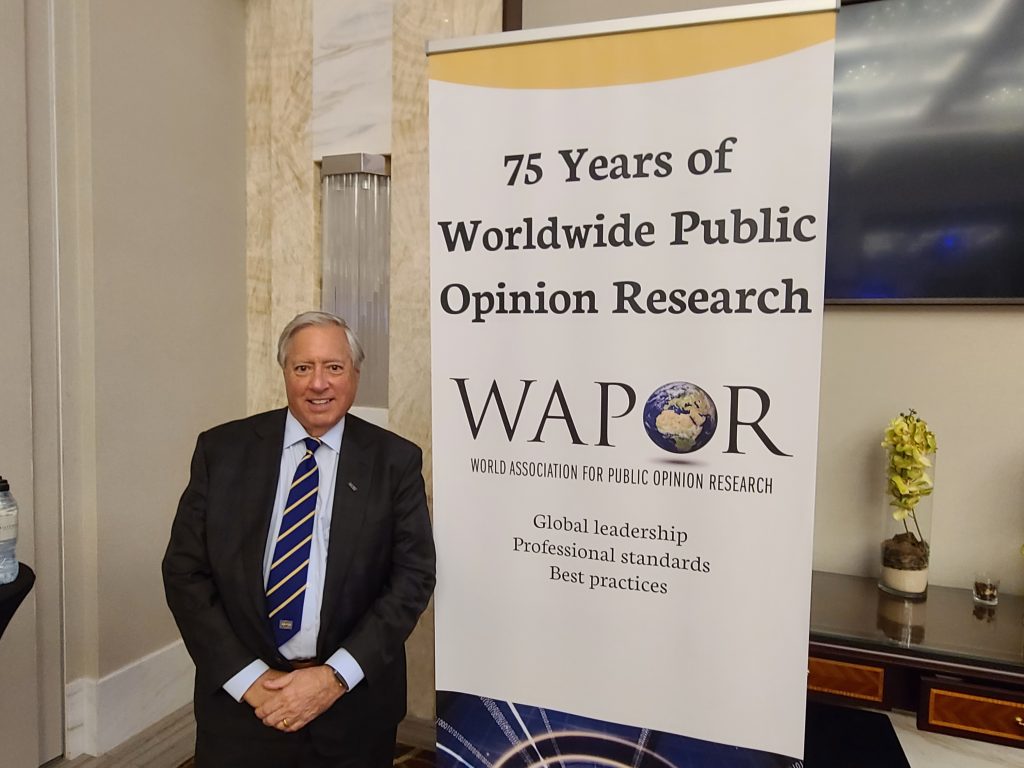D3 News
D3 Presents at WAPOR 2022
Nov. 17, 2022
D3 was a proud sponsor of the 75th Annual Conference held in Dubai this past week. Several our team members attended and presented at the conference. In addition, D3 is excited to announce and congratulate our Founder & CEO, David Jodice, for his election to become the Vice President & President-Elect of WAPOR. His term begins on January 1, 2023 and will continue in service to the WAPOR organization for six years.

Read about our presentations below and reach out for more information.
David Jodice chaired and presented during the 2022 ESOMAR-WAPOR Global Survey of the Freedom of Conduct and Publish Public Opinion Polls – Key Findings panel. In cooperation with ESOMAR, WAPOR conducted the periodic Freedom Survey, based on on-line questionnaires completed by over 180 opinion pollsters covering more than 156 countries across the globe. Dr. Jodice and team presented key findings of the survey, comparing core findings on the freedoms to conduct and publish public opinion by country, across regions and with the key findings of the 2017 survey. They also put the findings in the context of rising challenges to our freedoms and democracy itself, as measured by Freedom House and Reporters without Borders.
Timothy Van Blarcom chaired and presented during the Public Opinion Research in Central Asia panel. His presentation, entitled, Public Opinion in Central Asia: The Impact of Mode Change on Sample Coverage and Survey Results in Five Countries, explored the SARS-CoV-2 pandemic impact on polling. This presentation analyzes the impact of this mode change on the Total Survey Error of the surveys with particular attention paid to coverage bias, non-response bias, and mode effects. In this case study, like many in the last few years, the mode change was inevitable due to the global pandemic and survey practitioners had little to no time to prepare. Better understanding and application of the Total Survey Error model, as well as some practical considerations to current surveys, can better prepare the industry for similar rapid shifts in the future.
Joséphine Neulen presented during the Public Opinion in Asia and the Middle East: New Findings and Insights from the World Values Survey (2017-2022) on Afghan Public Opinion of the War in the 2010s, a paper she partnered on with Sam Solomon and David Rae. With the United States ending its long war in Afghanistan in 2021, this paper aims to shed light on some of the social dimensions of the conflict in Afghanistan by exploring how Afghan public opinion towards the war and its principal actors (the United States, the Taliban, and the government of the Islamic Republic of Afghanistan) changed or did not change over the second decade of this conflict. This paper analyzes the evolution of public opinion in Afghanistan with data collected from a series of D3-commissioned nationally representative surveys of Afghanistan. The data for these surveys were collected by ACSOR Surveys, D3’s subsidiary research firm in Afghanistan. They include more than 30,000 interviews with Afghans collected between 2010 to 2021. This paper also makes use of a district-level accessibility tracker collected bimonthly by ACSOR over the same period. The combination of these two sources allows us to explore the relationship between changes in Taliban presence and public opinion towards the war’s principal actors. The analysis will test the hypothesis that Afghans demonstrated a “stability bias,” in which they preferred the fighting to end, more than identify with one faction or another. This is operationalized through several survey questions and tested by comparing groups of responses based on their proximity to areas with Taliban presence.
Connor Hirsch presented during the Methodological Challenges and Improvements in the Areas of Sampling, Measurement, Survey Design, and Survey Response or Non-Response on Comparing Modes of Opinion Polling in Africa: Twitter Scraping vs. Face-to-face in Kenya. In Fall 2021, D3 led a study of the efficacy of these two modes of research by comparing the results of a nationally representative face-to-face poll of Kenyan adults ages 18 and older with sentiments scraped and quantified from nearly six million tweets sent from Kenya. For the national sample, D3 and its Kenyan partner, Infinite Insight, conducted a multi-stage probability-based study of views on technology and media use; governance and the economy; foreign affairs; COVID-19; national security; and politics and elections. Meanwhile, D3 analysts and partners at the United States Military Academy at West Point collected tweets on similar topics from across Kenya using the RStudio package “rtweet”. The team then calculated positive or negative sentiment scores for unique tweets on the same topics which were included in our face-to-face survey. D3 will present lessons learned on the efficacy of Twitter scraping vis nationally representative face-to-face polling and findings from the face-to-face poll. The key takeaway is that Twitter scraping does not presently offer a reliable substitute for face-to-face research for three reasons: (a) compiling a usable sample requires scraping, cleaning, sorting, and analyzing millions of tweets; (b) quantifying sentiment in tweets is difficult; and (c) the lack of statistically significant correlations between face-to-face and Twitter scraping data suggests that Twitter scraping does not accurately represent the sentiments of a wider population.